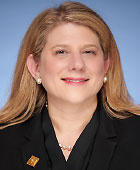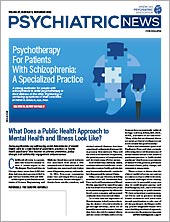Mental health in the United States continues to be a central part of the national conversation more than ever. Through monthly polls, APA is learning firsthand what is on Americans’ minds to advance the goal of high-quality, evidence-based care for mental and substance use disorders for every American. But, while the topic of mental health continues front and center in our individual and collective attentions, accurate evidence-based guidance is often hard to come by: All too often, readily available information about mental and substance use disorders is misleading, incomplete, or, even worse, just plain wrong. Reliable information is particularly important for members of underserved communities, including the growing number of Americans for whom English is not their native language.
As psychiatrists and as citizens, we have a responsibility to the fellow Americans we serve to not just be
part of the national mental health conversation but
leaders and drivers of the scientifically supported and accessibility discussion around treatment for mental and substance use disorders. With our leadership, we can (and we
will) actively create and promote evidence-based resources and care across the country. For example, during Hispanic Heritage Month, APA launched a groundbreaking Spanish-language campaign to raise awareness and produce evidence-based resources on mental and substance use disorders for native Spanish speakers in this country (
APA Launches Website Hosting Spanish Language Resources for Patients, Psychiatrists). A member-led working group of the APA Council on Communications, chaired by Hector Cólon-Rivera, M.D., and Amalia Londoño Tobón, M.D., and composed of Hispanic and Latino APA members, most of whom are native Spanish speakers, have provided valuable guidance and content support for this initiative.
This project is not simply an effort to translate APA’s existing English-language resources. While our resources contain high-quality, evidence-based information, they do not capture the unique cultural intricacies of how mental and substance use disorders are viewed and discussed in this country’s Spanish-speaking community. APA’s Healthy Minds monthly polling results remind us that the concerns of Hispanic Americans are not necessarily the same as for other Americans. Thus, all of the informational resources created by the working group, which are posted at
LaSaludMental.org, were developed to be relatable, culturally relevant, and able to be read and understood by a wide segment of Spanish-speaking people in the United States, who share a common language but come from an array of unique ethnic and cultural backgrounds. As always, the expertise and lived experience of our members are huge assets as we work not only to create these resources, but also to reach out to native Spanish speakers in our country and engage with them on issues related to mental and substance use disorders.
Over the past several months, members of the working group have volunteered to serve as media spokespeople for APA to the Spanish-language press and have already participated in multiple interviews with national outlets like Telemundo, Univision, and myriad local Spanish-language radio stations. Many of these interviews featured call-in segments during which our members directly engaged with the public, answered questions, and dispelled persistent myths around mental health.
These real-time, informed, reliable, and accessible interactions are crucial to confronting and eradicating stigma, misinformation, and general confusion about mental health for Spanish speakers. The more our members can participate in these conversations with patients, families, and the public, the more progress we will make in raising awareness of the importance of mental health and seeking help when needed. We will also be more successful in reaching young people of all cultures and backgrounds whom we need to become the psychiatrists of tomorrow and gain precious ground in the fight against stigma and misinformation as barriers to mental health care.
The Spanish Language Communications Initiative is a massive undertaking and a major starting point for APA’s outreach to minority and underserved communities. While this initiative is our most intensive outreach effort right now, much of APA’s day-to-day work is focused on giving psychiatrists the tools they need to establish ourselves and our profession as trustworthy so that we may engage with patients from a wide variety of ethnic, religious, racial, and cultural backgrounds in advancing the mental health of every American. These public outreach efforts, especially to our neighbors historically excluded from the benefits of mental health care, are mission critical for the future of our profession and our society. To find out more, please visit
www.LaSaludMental.org, and, as always, I look forward to hearing about your ideas and innovative work for the future of psychiatry. Don’t forget to follow me on Twitter
@Pres_APA. ■

